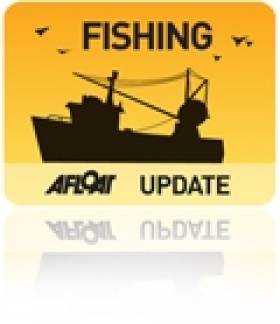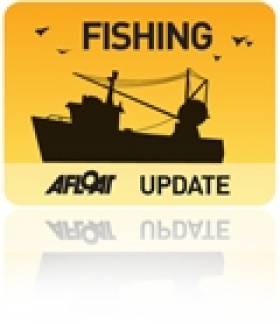Displaying items by tag: SeaFisheries
Following inspection of the vessel's papers, the vessel was detained and was escorted to Rosslare at approximately 1am on the morning of Friday 5th August. Sea-Fisheries Protection Officers undertook an investigation and valuation of the catch and fishing gears onboard the vessel. Legal proceedings involving An Garda Siochana and the SFPA were initiated on the 5th August in Rosslare against the Master of the vessel.
Peter Whelan, Chairman of the SFPA said: "The illegal landing of fish only serves to depress the price the legitimate fisherman should be achieving for fish. It also distorts the markets and only serves to benefit those involved in illegal fishing activity. Licensing and authorisation of fishing vessels is a basic perquisite of EU and Irish law. The role of the SFPA supports profitable, sustainable, managed fisheries at a time when the fishing industry faces many challenges. Effective monitoring and control systems safe-guards the good reputation of Irish food producers in the international marketplace and protects Irish taxpayer from the threat of large fines being imposed when non-compliances with the Common Fisheries Policy are encountered."
This year Ireland will provide the Naval Vessel LE Aoife which will act as a platform for inspectors from Ireland, United Kingdom, France and Spain to engage in fisheries control. This patrol will take place in May and will operate in the European Economic Zone's of Ireland, United Kingdom, France and Spain.
Historically the control of trans-boundary fishing was a problem as fishing vessels could cross from one jurisdiction to another to avoid inspection. The problem was initially very prevalent in the North Sea and the first proposals for trans-boundary co-operation within the EU were developed there.
The European Commission has formalised the protocols through the introduction of legislation. Ireland, United Kingdom, France and Spain have worked very closely on this protocol. Ireland has shared boundaries for fisheries control with these other Member States.
Peter Whelan, Chairman of the SFPA said: "The SFPA's authorisation of this latest fisheries patrol is aligned with our goal of promoting a level playing field across EU waters. I welcome this initiative which I believe will benefit all fishermen who operate in compliance with the law. As fisheries are a common resource it is vital that all operators from all EU fleets respect the rules. We must rebuild our fish stocks by implementing conservation measures and tackling illegal fishing by fleets in our waters which is a major cause of the decline in our fish stocks and quotas. This initiative will provide an opportunity to stop the cycle of decline which in turn will support the development of a sustainable profitable future for our industry. We will continue to work with the Competent Authorities of other Member States to promote a uniform standard of fisheries control."

























































